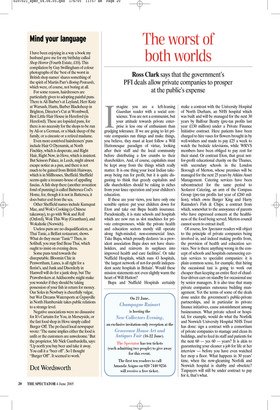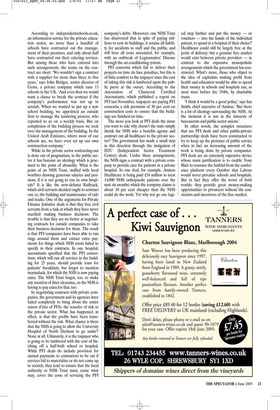The worst of both worlds
Ross Clark says that the government’s PFI deals allow private companies to prosper at the public’s expense Imagine you are a left-leaning Guardian reader with a social conscience. You are not a communist, but your attitude towards private enterprise is less one of enthusiasm than grudging tolerance. If we are going to let private companies run things and make things, you believe, they must at least follow a Will Huttonesque paradigm of virtue, looking after their staff and the local community before distributing a few crumbs to their shareholders. And, of course, capitalists must be kept away from the things which really matter. It is one thing your local Indian takeaway being run for profit, but it is quite disgusting to think that greedy capitalists and idle shareholders should be raking in riches from your knee operation and your children’s education.
If these are your views, you have only one sensible option: put your children down for Eton and take out Bupa health insurance. Paradoxically, it is state schools and hospitals which are now run as slot machines for private entrepreneurs, while the private health and education sectors mostly still operate along high-minded, non-commercial lines. Take Bupa, which proudly declares ‘as a provident association Bupa does not have shareholders, and reinvests its surpluses into improved health and care facilities’. Or take Nuffield Hospitals, which runs 43 hospitals, ‘the largest network of not-for-profit independent acute hospitals in Britain’. Would these mission statements not even slightly warm the heart of Will Hutton?
Bupa and Nuffield Hospitals certainly make a contrast with the University Hospital of North Durham, an NHS hospital which was built and will be managed for the next 30 years by Balfour Beatty (pre-tax profits last year £130 million) under a Private Finance Initiative contract. Here patients have been charged to hire vases for flowers brought in by well-wishers and made to pay £25 a week to watch the bedside televisions, while WRVS members have been obliged to pay rent for their stand. Or contrast Eton, that great notfor-profit educational charity on the Thames, with secondary schools in the London Borough of Merton, whose premises will be managed for the next 25 years by Atkins Asset Management. Catering services have been subcontracted for the same period to Scolarest Catering, an arm of the Compass Group (pre-tax profits last year of £260 million), which owns Burger King and Harry Ramsden’s Fish & Chips; a contract from which, somewhat to the annoyance of parents who have expressed concern at the healthiness of the food being served, Merton council cannot seem to extract itself.
Of course, few Spectator readers will object to the principle of private companies being involved in, and indeed making profits from, the provision of health and education services. Nor is there anything wrong in the concept of schools and hospitals outsourcing certain services to specialist companies: it is plain common sense, for example, that hiring the occasional taxi is going to work out cheaper than keeping an entire fleet of chauffeur-driven cars on standby for occasional use by senior managers. It is also true that many private companies outsource building management. Yet the terms of some of the deals done under the government’s public-private partnerships, and in particular its private finance initiatives, cause astonishment among businessmen. What private school or hospital, for example, would do what the Norfolk and Norwich University Hospital NHS Trust has done: sign a contract with a consortium of private companies to manage and clean its buildings, and to feed its staff and patients for the next 60 — yes 60 — years? It is akin to guaranteeing your cleaner a job for life at her interview — before you have even watched her mop a floor. What happens in 30 years’ time, when the now-gleaming Norfolk and Norwich hospital is shabby and obsolete? Taxpayers will still be under contract to pay for it, that’s what. According to independentschools.co.uk, an information service for the private education sector, no more than a handful of schools have contracted out the management of their premises, and only about half have contracted out their catering services. But among those who have entered into such arrangements, the terms on the contract are short. ‘We wouldn’t sign a contract with a supplier for more than three to five years,’ says John Bridger, senior director of Gems, a private company which runs 13 schools in the UK. ‘And even then we would want a clause to break the contract if the company’s performance was not up to scratch. When we wanted to put up a new school building, we appointed an outside firm to manage the tendering process, who reported to us on a weekly basis. But on completion of the building process we took over the management of the building. In the United Arab Emirates, where most of our schools are, we have even set up our own construction company.’ While in the private sector contracting-out is done out of pragmatism, in the public sector it has become an ideology which is practised to the point of absurdity. What is the point of an NHS Trust, stuffed with local worthies drawing generous salaries and pensions, if it is not going to run its own hospitals? It is like the now-defunct Railtrack, which civil servants decided ought to contract out, er, the building and maintenance of rails and tracks. One of the arguments for Private Finance Initiative deals is that they free civil servants from a task at which they have never excelled: making business decisions. The trouble is that they are no better at negotiating contracts for outside companies to take their business decisions for them. The result is that PFI companies have been able to run rings around them and extract extra payments for things which NHS trusts failed to specify in their contracts. In one hospital, accountants specified that the PFI consortium, which will run all services in the building for 25 years, should provide toast for patients’ breakfasts, but forgot to mention marmalade, for which the NHS is now paying extra. The NHS Trust forgot, too, to make any mention of litter clearance, so the NHS is having to pay extra for that, too.
In negotiating contracts with private companies, the government and its agencies have failed completely to bring about the entire raison d’être of PFIs: the transfer of risk to the private sector. What has happened, in effect, is that the profits have been transferred without the risk. What chance is there that the NHS is going to allow the University Hospital of North Durham to go under? None at all. Ultimately, it is the taxpayer who is going to be lumbered with the cost of finishing off a half-built school or hospital. While PFI deals do include provision for annual payments to contractors to be cut if services fail to materialise or do not come up to scratch, they tend to ensure that the local authority or NHS Trust must, come what may, cover the costs of servicing the PFI company’s debts. Moreover, one NHS Trust has discovered that in spite of paying millions to rent its buildings, it retains all liability for accidents to staff and the public, and will bear all costs associated, for example, with an outbreak of Legionnaires’ Disease through the air-conditioning system.
PFI consortia which fail to deliver their projects on time do face penalties, but this is of little comfort to the taxpayer since the cost of taking this risk is lumbered upon the public purse at the outset. According to the Association of Chartered Certified Accountants, which published a report on PFI last November, taxpayers are paying PFI consortia a risk premium of 30 per cent on construction costs to ensure that the buildings are finished on time.
The more you look at PFI deals the more you want to ask: why doesn’t the state simply shrink the NHS into a benefits agency and contract out all healthcare to the private sector? The government has made a small step in this direction through the instigation of ISTC (Independent Sector Treatment Centre) deals. Under these arrangements, the NHS signs a contract with a private company to provide care for patients in a private hospital. In one deal, for example, Amicus Healthcare is being paid £54 million to treat 14,000 NHS orthopaedic patients over the next six months; which the company claims is about 10 per cent cheaper than the NHS could do the work. Yet why not go one logi cal step further and put the money — or vouchers — into the hands of the individual patient, to spend at a hospital of their choice? Healthcare could still be largely free at the point of delivery, but a genuine free market would exist between private providers — in contrast to the expensive monopolistic arrangements which the government has constructed. What’s more, those who object to the idea of capitalists making profit from health and education would be able to spend their money in schools and hospitals run, as most were before the 1940s, by charitable trusts.
‘I think it would be a good policy,’ says Ian Smith, chief executive of Amicus. ‘But there is a lot of ideology surrounding the NHS. At the moment it is run in the interests of bureaucrats and public sector unions.’ In other words, the complex structures that are PFI deals and other public-private partnership deals have been constructed to try to keep up the pretence of public service when in fact an increasing amount of the work is being done by private companies. PFI deals are an extremely expensive device whose main justification is to enable Tony Blair to reassure the faithful from the conference platform every October that Labour would never privatise schools and hospitals. But in fact they offer the worst of both worlds: they provide great money-making opportunities to privateers without the constraints and incentives of the free market.



















































 Previous page
Previous page